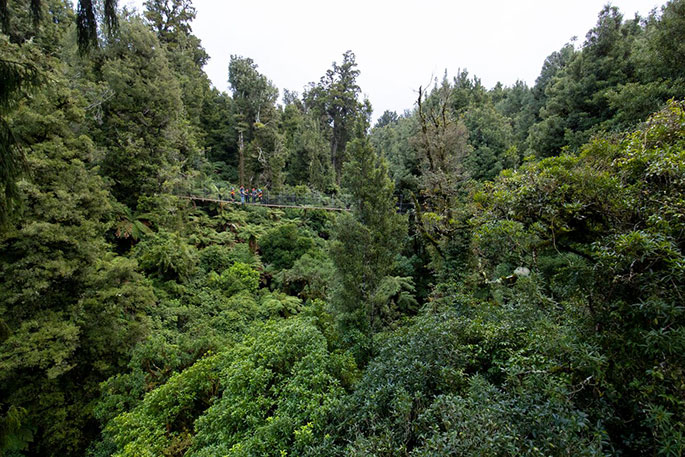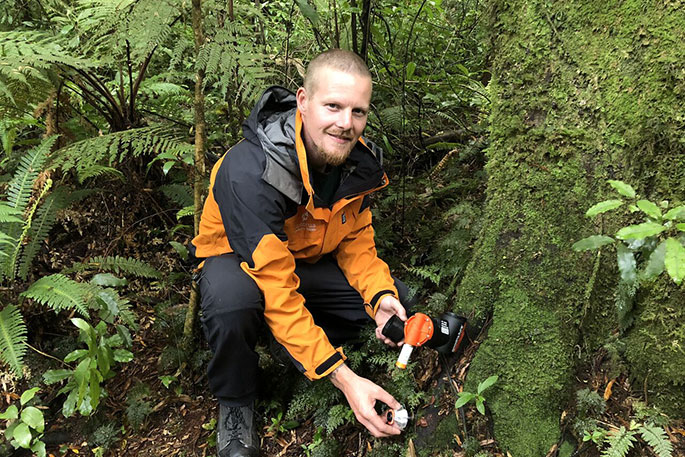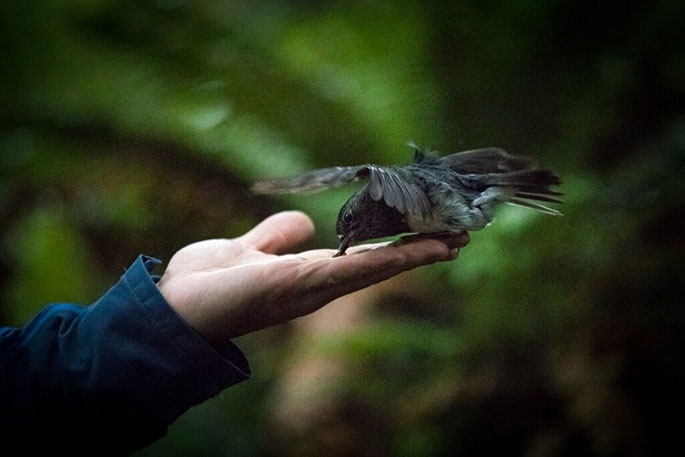Scenic Reserve following a five-year intensive pest control programme run by Canopy Tours.
Dansey Rotorua's Falcon) is just one of the native species of birds flocking back to Zealand (New KāreareaThe nationally threatened
Canopy Tours, which operates New Zealand's only two native forest ziplines, this week completed its bi-annual monitoring and reset of the reserve's trapping network with stellar results.
The untouched native forest is located in the Mamaku Plateau's ancient forest on the outskirts of Rotorua.
Little evidence of dead predators – rats and stoats – was found by the 9-strong conservation team painstakingly checking every one of the 515 number of traps across the reserve this week. At the same time, the number and variety of birds in the pest-free island is noticeably increasing.
Scott Davis, the Conservation Lead at Canopy Tours says the return of native birds is inspiring, and a fantastic result of the trapping efforts.
'It's really exciting to see different species coming back and a greater number of all species in the reserve. The tangible impact of 5 years of conservation blitzes is a win for all Kiwis,” says Davis. 'Especially seeing two species of Koekoeā returning to lay their eggs here and catching sight of the increasingly rare Kārearea.”
Recent new arrivals to flock back to the reserve are more sightings of Kārearea (New Zealand Falcon), our nation's only threatened bird of prey with only 3,000-5,000 breeding pairs left in existence, along with two species of cuckoo birds - Pīpīwharauroa (Green Shining Cuckoo) and the Koekoeā (Long Tail Cuckoo).

Canopy Tours has a mix of Goodnature A24 (rat and stoat traps) and A12 (possum traps) traps operating in the Dansey Road Scenic Reserve, along with some DOC 200s.
The combined impact this array of traps has had on the forest has been incredible, with the forest regenerating visibly in the 5 years of trapping.
'We love it when our technology supports conservation businesses like Canopy Tours,” says Goodnature co-founder Robbie van Dam.
'Canopy Tours is a great example of how businesses in the community are helping us to bring back the birds through really sophisticated conservation work.”
This predator control work was set up through a unique partnership with the Department of Conservation, where Canopy Tours and DOC operated under an agreement that a percentage of the rent Canopy Tours paid for leasing the land goes back into conservation work in the forest. The two matched each other, dollar for dollar.
The partnership agreement expired in April and Canopy Tours is doing their research and planning the projects before they apply for another three-year agreement.
A percentage of profit from the Canopy Tours business still goes back into the Trust's work in restoring the native reserve.
A conservation driven business, Canopy Tours has been leading by example by working towards the nation's predator free goals. Five years in, they have almost achieved their goal of creating an inland island acting as a sanctuary for native birds.
This inland island is home to the adventure experience business's two Canopy Tours - the Original Canopy Tour and the recently launched Ultimate Canopy Tour, where visitors can handfeed rare native birds, and witness the regeneration of precious native forest.
Paul Button, General Manager of Canopy Tours is proud of the conservation efforts the business is focusing on in the 250-ha reserve.
'Conservation is at the heart of our business. Our team culture is centred around it, and this extends to the visitor experience at Canopy Tours. Visitors are increasingly invested in the conservation work, and love being able to contribute at an individual level, interacting with our native birds and experiencing a regenerating forest,” says Button.
'Every native bird, skink, tree, and insect we see thriving in our forest is more reason to keep on providing protection for them.
Across New Zealand, native birds are susceptible to rats, possums and stoats - 70,000 birds are killed every night by pest species, equating to 25 million birds per year according to DOC. Businesses, community groups, DOC and iwi are essential in implementing and maintaining sustainable predator control efforts.
Canopy Tours is one of two places in New Zealand to legally feed Toutouwai (North Island Robin) and Miromiro (Tomtit), meaning visitors have a unique experience and leave feeling positive about conservation.
With the removal of predators, the forest itself is changing. Plants eaten by possums, such as puahou (five fingers), are coming back in force and forest floor plants are changing now that rats aren't eating seeds before they can germinate.
'Protecting our native bird and plant species is a national goal for all of New Zealand,” says Button.
'We're proud to be working towards these goals as a business and inspiring all of our visitors.”
 Scott rebaiting an A24.
Scott rebaiting an A24.



0 comments
Leave a Comment
You must be logged in to make a comment.